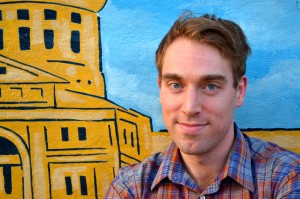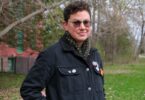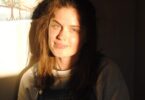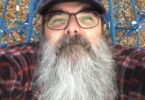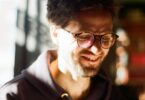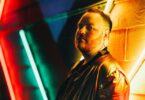Greg Marshall
Only after Dad broke his neck diving into the ocean in Hawaii did we start playing tennis together. Partly, this was a matter of timing. I was ten at the time of the accident; Dad was forty-two. More importantly, though, it was a matter of handicapping. It took Dad fracturing his top two cervical vertebrae and then having them fused together with a sliver of hipbone and tiny titanium screws to make our matches competitive.
Every sports story is the same when fathers and sons are involved. The father teaches the son to play and the son eventually surpasses him, or doesn’t. The twist in my rivalry with Dad, if you could call it that, was our joint lack of twisting ability, our physical limitations. This was not just Bob versus Greg, father taking on son, but neck versus leg, spinal injury versus cerebral palsy.
On my birthday, Mom liked to retell the story of my traumatic birth. It involved her doing a headstand to get me off the umbilical cord. At nine months, when I tried to pull myself up to the coffee table or couch, I sprang to the ball of my right foot, my tippy toes, and limped so badly I wore out the tops of shoes rather than the bottoms.
The brusque orthopedic specialist who diagnosed me with cerebral palsy at eighteen months didn’t appreciate the fact that I peed on the floor of the exam room. “He’s incontinent, too?” he allegedly said. Trying to lighten the mood, Mom noted my stifled, shuffling trot by quipping, “My son walks like Herman Munster.”
Fair to say Dad was now a Munster, too.
Trunk stiff, chin jammed against Adam’s apple, Dad could no longer turn his head more than an inch to the left or right, making his peripheral vision work overtime, like a Kit-Cat Clock. His game was one of straight lines and little topspin, his toss high and out in front, his preferred backhand a slice. As points developed, he moved with rigid dignity along the baseline, getting to the ball only by almost running past it, flicking as he went and then catching himself on the fence.
Unlike some of the old guys you’d see play at the Cottonwood Club, Dad couldn’t tell you if he was a two-point-oh or a two-point-five. Nor did he bother with a preppy outfit, preferring instead his after-work clothes: white socks, mesh running shoes, a holey T-shirt from his days as the publisher of the Pekin Daily Times. Such were the perks of having a court in our backyard. Dad could lower the lid on whatever he was grilling and stride down the gazebo steps to hit with me, stopping at the ball machine to load his khaki pockets. My fifth-grade science fair project was a ball dispenser. Serve It Up, I think we called it. Not only did Dad built the thing out of PVC pipe and bolt it to the back fence, he also made a point of using it. We never played with fewer than twenty balls.
It sounds extravagant, I know, having a tennis court next to your house. Why deny it? It was. Lifting the latch was like opening the door to summer. A stand of pine trees in the front yard sent plumes of swirling yellow pollen over us and cast long, pleasing shadows over the hardcourt’s green playing surface. The sunny southern side was a breeding ground for boxelder bugs. Only occasionally did I have the heart to crush them with a basketball.
The little girls’ tricycles littered the backcourt and a side gate with a rusty padlock led to a shortcut to Rainbow for Slurpees provided we were willing to squeeze around a concrete cesspit covered in bushes, like a trap, and sneak through yards. The court was where my parents held square-dancing parties and water-balloon relays for my brother Danny’s late-September birthday. It was where I tried, and failed, to ride a bike without training wheels.
My mom was first diagnosed with stage IV non-Hodgkin’s lymphoma when I was in the second grade. When she relapsed four years later, we made a point of playing family doubles before chemo and checkups with Dr. Buys. The idea was to let Mom hit a few balls and arrive at the hospital in a skirt, looking like she belonged in a clubhouse rather than at the Huntsman Cancer Institute.
At least in the summer, no matter how early an appointment, I’d wake to hear the pock of the ball coming off Dad’s Wilson Profile, purchased in 1987 and never upgraded. “Come on, Bobby Boy,” he’d call, urging himself on. Through the tree branches blossoming purple outside my window, I’d spy my Prednisone-plump mom swerving wide for a return. “So you’re making the fat lady run this morning, huh?”
Tennis was my family’s chance to forget about cancer and act like ourselves again, unencumbered by the constraints of mortal illness. Out the back door with my shoes balanced on my racquet, my socks getting soggier with every step, I’d find the little girls stomping around the trampoline, using their peewee racquets as fairy catchers. Moose would be posted up near the rose bushes just outside the gate, watching the action on the court as diligently as a line judge, a dead tennis ball or two in his mouth as he tried to squeeze in next to me.
You may be wondering where my older siblings fit into my rivalry with Dad. After all, they were out there, too. Danny had the talent but not the temperament for a game played largely against himself. A classic tennis brat, he was notorious for chucking his racquet, a Wilson Hammer. We played a few good points over the years but he’d usually skunk me 6–0 and call me a fag in the process. My sister Tiffany was notorious for biting her tongue and taking huge backswings, moving the racquet straight across her body rather than following through over her shoulder. We rallied all the time, but she had weak wrists and didn’t like to serve, plus she was angling for a spot on the US Olympic development team in half-pipe snowboarding and trained even during the off-season.
I was the cripple in a family of athletes.
As I started to take my lessons and league matches more seriously, as I challenged kids on the ladder, Dad became more than my hitting partner. If anything, it bugged me that he handed me calls. Balls that landed six inches wide miraculously hit the line in my dad’s estimation. If I missed a second serve, he’d dig a ball from his overstuffed pocket and have it bouncing my way before I could move to the other side of the centre mark.
“Redo,” Dad would say. “Take another.”
“I know what you’re doing,” I’d holler to him.
“What’s that, Greggo?” he’d say lamely, like he couldn’t hear me.
“You’re trying to build my confidence.”
Tennis was a good sport for a kid with what my family referred to as “tight tendons.” Even on our cracked and weed-riddled court there was little to trip over besides my own feet. The worst I’d do was scuff up the baseline and burn a hole in the right toe of my tennis shoe. My New Balance sneakers were arch-supporting and orthopedic, one of my first online purchases, and there was something freeing about being in them, chasing down balls just to call them out, daring myself to net. Once I got there it was clear I didn’t know what to do, and I usually took a big swing and missed by several feet.
Since I already had a one-handed backhand (modeled after Pete Sampras’s, not my dad’s), I didn’t have to wait for my clumsy right side to let me down. Believe it or not, I was more coordinated than a lot of kids my age. Some of this was the natural advantage of having a court at home, but some of it was a bit of modest talent. It made me wonder what my life would have been if I hadn’t crushed my umbilical cord on the way out of Mom’s uterus. Could I have been an athlete?
“If you ask me, Greggo, you already are one,” Dad would say.
◊ ◊ ◊
The first time I beat Dad in tennis was on my sixteenth birthday. I won the set 6–4. It was fairly obvious he’d thrown the match, but as he shook my hand at net and then pulled me into a smelly hug, I couldn’t help but be proud, especially since, a few months later, I was laid up from a pair of leg surgeries meant to stretch my tight hamstrings. The only tennis balls Dad and I could hit that winter were the imaginary kind, though even then we rallied back and forth, batting an invisible ball around the kitchen.
At physical therapy, I had a habit of turning my steps into lunges. This was from the misguided belief that if I exaggerated my walk it might stop me from dragging my foot and erase my limp. What it did, more than anything else, was throw me off balance. “Small steps to the ball,” Dad said, using a tennis analogy. My brother and I had filmed each other’s serves, but it took my dad coaching me in the hall outside my room for me to understand how I moved. “You’re being a little tentative with your arms,” he’d say. “Remember to swing them. Swing through the ball!”
To try out for my high school’s tennis team that spring, I made a point of wearing a sleeve on my good left knee. My excuse for playing with it was that the incision site had been mildly swollen since surgery, but my real reason was that I hoped it would spare me having to explain why I was limping. “It still looks like you’re favouring your right leg,” Coach Snarr observed.
I didn’t make the team, not even junior varsity. It didn’t matter. I had Dad.
The tennis bubble at the club came down for the summer and, as soon as it was warm enough, Dad and I started driving over there to play night tennis. Grand old cottonwoods discharged bugs, seeds, and pulp onto the courts and the smell of duck poop permeated the grounds, but it was cool to play through sunset and into the violet of dusk. Honestly, I can’t remember one specific conversation about anything on those nights: politics, AP classes, college applications, just a pleasant exchange of ideas as we sipped from paper cones and looked up at the insects magnetized to the lights.
Cerebral palsy has many negatives. One of the positives is that it all but requires you to stretch and stay active as a form of physical therapy. I shouldn’t take the credit for my dad’s interest in running, but I will. He first purchased a treadmill to put in my room when I was six or seven. After Grandpa Wendell had a series of strokes, Dad moved the treadmill to the basement and started jogging on it a few times a week.
By the time I was a junior in high school, he’d added a recumbent bike, a yoga mat, and a pyramid of weights. Once my hamstrings were back in working order, I started running on the treadmill every day. Eventually, I could go more than five miles in forty minutes. “It’s like you’re punishing the motherfucker,” Tiffany observed from the stairs. Dad would hear me thumping away, the TV blaring, and I think it motivated him to run more. Tiffany and my mom, too. Soon we were all down there, stretching, doing abs, lifting weights, biking, and jogging.
◊ ◊ ◊
The week before I left for college at Northwestern, Dad took me to Flushing Meadows to see the US Open. What I remember most about the tournament were the spectacular rain delays, washouts that let us wander onto show courts and survey the wet, glistening playing surface from the umpire’s chair. And who could resist taking spots on opposite baselines and miming some serves and ground strokes?
In the closet about both my leg and my sexuality, the first two quarters of college were rocky. The only tennis I played was over email, and those points tended to be pretty one-sided. I’d write a hammy line about uncorking a serve out wide and instead of playing along, responding with something outlandish—how he’d jump into the stands to block back the serve, or, better yet, strap on a jetpack—my straightforward Dad would reply, “I’m excited to get back out there too. I’ll get a court reserved.”
The serves I uncorked on the hardcourts of a Palm Desert Marriott over spring break were eminently more returnable than those I had imagined. No jet pack required. Nineteen and still a virgin, I had other things on my mind. It was time to make like the macaw in the lobby and announce I was GAAY. In terms of set pieces, I could have gone for the dramatic, the clay courts, say, or the flamingo pond.
When it came down to it, I chose the quiet of our villa, starting with my mom.
She had a range of reactions over the course of the day, from saying she liked gay men way more than straight men to telling me, as we treaded water at the main pool, that it felt like she had been hit in the stomach with a shovel. My dad’s response that evening was characteristically low-key. Eating Triscuits and sipping wine on the back patio, he said, “I see this as a non-issue, Greggo.”
“Now hug,” Mom instructed, and Dad pulled me in, like we’d just finished a match. The next day we picked up a set right where we’d left off. “It makes sense if you think about it,” Dad said, piecing things together. “Most of your friends are girls.”
◊ ◊ ◊
While I trekked through Evanston blizzards to the campus gym four times a week, Dad took up long-distance running. He lived on swag-bag gel packs and in bright marathon shirts. Danny and Tiffany and I ran with him in a Cold Turkey 5k and a summer 10k. When it came to marathons, though, I was strictly spirit team. I dropped Dad and his buddies off at an out-of-the-way golf course up Parley Canyon one dawn and then drove around to different spots along the Salt Lake Marathon route to cheer and take pictures.
The finish line was in Research Park, near Huntsman, where my mom was again receiving treatment for non-Hodgkin’s lymphoma. It was a moving sight, Mom in her No Hair Day hat, standing on tiptoe to give my sweaty Dad a kiss.
Dad raced in the Chicago Marathon that fall. Honoured that he had wanted to run near the city where I was living, I took the El into the Loop and waited for hours so I could high-five him as he jogged by. The weather was frigid and after taking pictures around Buckingham Fountain, we all needed a post-race soak in the hotel pool to warm up. Dad had lost weight and a muscle in his chest wouldn’t stop twitching. His internist had said this was probably the result of a potassium deficiency but he’d nevertheless been referred to a neurologist.
My parents called with the bombshell diagnosis of Lou Gehrig’s disease a few days after returning home. It was hard to grasp the magnitude of the news. “Is it the running?” I asked. “Does this have anything to do with your neck?”
Dad didn’t know. We still don’t.
Determined that nothing should change, we played a set in the bubble that Thanksgiving, only one of us knowing it would be the last time we would be on the court together. During one point, he flubbed a backhand, got jammed up, and tried to use two hands instead of one to carry the racquet across his body.
I beat him by an unprecedented margin, 6–2.
“The racquet felt like it weighed a ton,” Dad said with a baffled smile.
“Really?” I said, shaking his hand. “I didn’t notice a difference.”
◊ ◊ ◊
Given my dad’s declining health, moving home after college was a no-brainer. Our days weren’t filled with tennis but with clinic appointments and a breathing machine called a BiPAP that had to be refilled like a humidifier. The mask was so ill-fitting it rubbed the bridge of Dad’s nose raw, leaving behind an acne-bright scab. He slept on a firm wedge of a pillow with other pillows tucked under each arm and a feeding tube pinned to his shirt, his existence a blunt reminder of physical need.
“This isn’t drama class,” Mom told me after I made a face helping him blow his nose.
Since the start of college, Dad and I had gone on hikes together. It surprised us both, I think, the fact that I had inherited his love of the outdoors. Dad was too air-hungry to hit the trails by then, of course, so we took a scenic drive up one of the canyons near our house and brought along the BiPAP just in case. Parking on the side of the road, we walked a few feet to some wildflowers. I had forgotten to bring anything for us to sit on and so we lowered ourselves awkwardly onto some sharp rocks. I’d never seen him looking so gangly and long-limbed, so much like me. Dad must have been thinking along those same lines because he said, “I’m starting to get a sense of what it must be like for you with your leg. It just never goes away, does it?”
Almost a year to the day after our final tennis match, Dad had an emergency tracheotomy and went on a respirator. We celebrated Thanksgiving in rehab. By Christmas he was home, living in Tiffany’s old room, within earshot of my little sister Chelsea banging on the baby grand piano in the living room and the dogs scrambling on the hardwood floor in the kitchen. Dad’s diaphragm was shot, his arms and hands were pretty much useless, but his legs were still strong. My brother and I would walk with him down the hall to my room and back, one of us pushing air into his lungs with a tracheotomy bag, the other with a hand on his gait belt. The scar on his neck was rutted and pink, faded to almost nothing.
All sports stories are the same when fathers and sons are involved, even the ones that involve cancer, cerebral palsy, spinal injury, a son coming out, and Lou Gehrig’s disease. The father teaches the son to play and the son eventually clears mucus plugs from his dad’s throat and makes him shit to Dolly Parton’s version of “I Will Always Love You.”
The winter dragged on and on, but when it broke, it broke into flowers and rain, like some kind of magic trick. One thing you should know about my parents is that they still loved a walk. The ventilator, spare tubes, suction equipment, and monstrous electric wheelchair couldn’t change that. We’d ride the elevator to the garage and roll around the neighbourhood, Dad in his blaze-orange Boston cap, his crumpled finger controlling the chair, my mom, bald from another round of chemo, eating yogurt beside him.
After a spin around the block, I’d steer Dad through the back gate onto a new ramp we’d just had built and park him in the shade of the gazebo. The view wasn’t much, I’ll say that. The tennis court was a wreck without Dad’s stewardship. Covered in cracks and dog poop, anthills and boxelder bugs galore, it was more like a sundial than a tennis court, really, shadows keeping track of time. More than a dozen years had passed since Dad had broken his neck in Hawaii. Much of that time we had filled with tennis, though perhaps it’s more apt to say that tennis filled the cracks where self-doubt would have resided.
It amazes me to think of us out there, a man with a broken neck going toe to spastic toe with his son. In all that time, shambling after balls, burning holes through my right tennis shoes, I can’t remember feeling disabled. I felt like an athlete. Dad did that for me. He’s been dead eight years this fall, the big house has been sold, and the tennis court in our backyard is just a memory. But maybe in some alternate dimension, we’re still playing, switching sides so I don’t have to serve into the sun, redoing second serves, strapping on jetpacks. It’s a nice thought.
Before I moved home, my top concern was what it would be like to handle my dad’s penis. It was a valid anxiety for a gay twenty-two-year-old who had been out of the closet for all of three years. What if I were attracted to my own father? Thinking of that worry now makes me smile and shake my head. If only that had been the tough part, being overwhelmed by the beauty of putting a fifty-four-year-old penis into a plastic urinal.
Out of a mix of frustration and exhaustion one day, I told Mom that Dad’s body grossed me out, that it was disgusting. It wasn’t true and my mom and I both knew it.
“Your dad has a beautiful body,” she said matter-of-factly. “It just doesn’t work anymore.”
As Dad’s legs started to give out, the walks became trickier. If Danny or Tiffany weren’t around, I had to take the lead getting him into his wheelchair. Pulling Dad to a sitting position, hand on the back of his head, breathing tubes over my shoulder, I’d stand him up and pivot, and we’d both dip down to the seat, hoping I’d remembered to apply the brake. Most of the time, I could transfer him no problem, but I did drop him once. On his knees, as the machines squawked, he held me in his gaze and mouthed the word lift. Tennis is a kind of dance, the abstract movement of two people responding to each other. Lifting your dad off the floor is no less a dance. I couldn’t have done it without him, without all the strength in his legs and mine.
Greg Marshall is a graduate of the Michener Center for Writers and the former nonfiction editor of Bat City Review. His work has appeared in Electric Literature, Barely South, Tampa Review, Under the Gum Tree and elsewhere. Follow him on Twitter @gregrmarshall.

